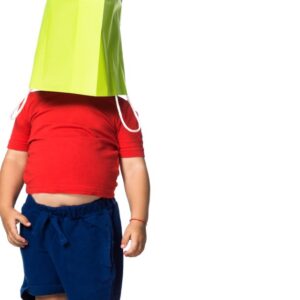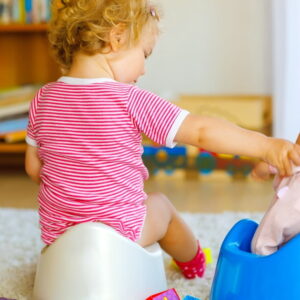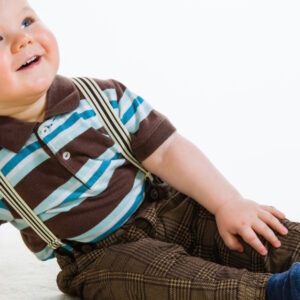Although definitions may vary, a child is considered a toddler when they are 1-3 years old. Toddler years are a time of rapid development and growth. It is a time when a child becomes more aware of themselves and the world around them. Their curiosity is increasing, and they are eager to explore their environment.
As parents, we want to protect our children, and we don’t want them to get hurt. However, toddlers will fall over (repeatedly) and bump their heads (multiple times probably), but that is part of the learning process.
Your toddler will start interacting with the world in a new and exciting way. This is a period of rapid development and change in a child’s physical, cognitive, and social development and in their communication and language skills.
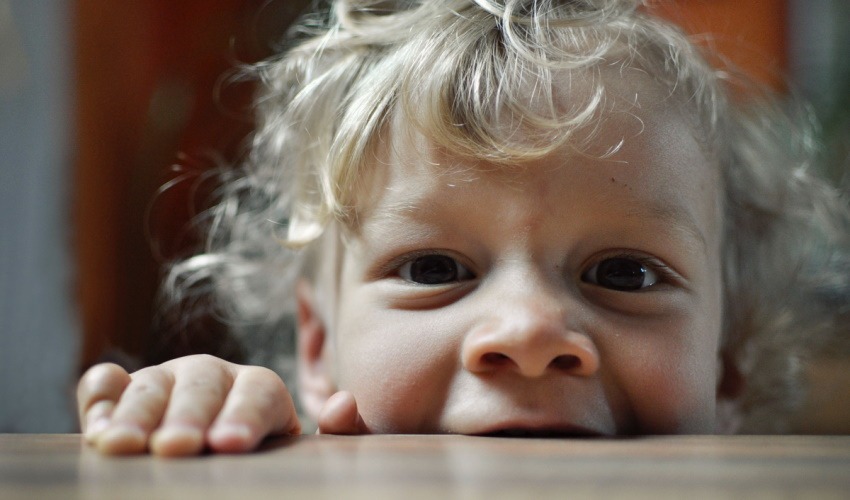
Toddler Development and How to Stimulate it with Play and Interaction
In this article:
- Physical and Motor Development Milestones
- How to Encourage Motor Development
- Physical and Motor Development Red Flags
- Cognitive Development Milestones
- How to Encourage Cognitive Development
- Cognitive Development Red Flags
- Social-Emotional Development Milestones
- How to Encourage Social-Emotional Development
- Social-Emotional Development Red Flags
- Communication and Language Skills
- How to Encourage Communication and Language Development
- Communication and Language Development Red Flags
Physical and Motor Development Milestones

Although growth during toddlerhood isn’t as rapid as in the infant’s stage, your child’s strength and coordination increase significantly. Teeth also develop rapidly at this time, and by the age of 3, most children will usually have all their teeth.
1-2 years old
One of the most significant milestones that mark toddlerhood is the start of walking. Every child is different, and we have to keep it in mind. The same applies to walking —some children start walking alone earlier (some as early as 9 months, although that is not so common), some start later. According to CDC, if your child is not walking at all by themselves by the age of 18 months or isn’t walking steadily by the age of 2, it is then recommended to talk to your pediatrician.
When your child is 1 year old, they are likely to stand alone and walk as they hold your hand (if they didn’t already begin walking alone). However, they will soon start letting go of your hand and walking without your help.
Between ages of 1.5 and 2 years, your toddler will be able to walk up the stairs while holding your hand.
Toddlers enjoy throwing and kicking objects. But, at first, they can only throw things overhead or kick a large ball.
In early toddlerhood, children start picking up objects precisely with their thumb and forefinger. Learning how to manipulate small objects is exciting and will allow your child to discover and enjoy many new activities. For example, they start using a spoon, drink from a straw, build towers of up to four blocks (knocking them down immediately, of course), place objects in and out of a container, draw scribbles, try to dress and undress themselves, and pull down zippers.
2-3 years old
Once your toddler learns how to walk, it may seem like they are constantly in motion. They have mastered such crucial skill, which makes them feel more independent and ready to explore their abilities and surroundings. They will run, climb and jump, and walk backward.
You can also expect your child to try walking up and down the stairs more independently now, at first by holding on, but later on, they will become more skilled at it, putting one foot on each step.
Now, they can also throw a ball overhand (still with no aim), kick even a smaller ball, and catch an object with their arms extended and their elbows stiff.
In later toddlerhood, they are already able to feed themselves well, draw lines or circular scribbles, build towers of six or more blocks, turn pages of the book, take simple objects apart and put them back together, wash and dry their hands, brush their teeth (still with a bit of help for a more thorough brushing), dress and undress themselves with a bit of help.
How to Encourage Motor Development
- Encourage your child to explore and practice new skills
- Encourage them to feed themselves, use a spoon, and drink from a cup—don’t obsess over how messy it may be
- Give your toddler toys to push or pull safely
- Invite your child to kick or throw a ball
- Play with blocks and build towers together
- Draw, paint, and do projects together
- Once your child is able to, encourage them to help you by carrying small things, opening the doors and drawers (monitor them, so they are safe while doing it)
- Take your child outside and to the park where they can practice running and climbing while you are near and watching closely
Physical and Motor Development Red Flags
It is recommended to talk to your child’s doctor if your child (according to CDC):
By the age of 1
- Doesn’t crawl or can’t stand when supported
By the age of 18 months
- Doesn’t walk at all
By the age of 2
- Doesn’t walk steadily
By the age of 3
- Falls a lot or has trouble with stair
- Or if your child loses skills they once had
Cognitive Development Milestones
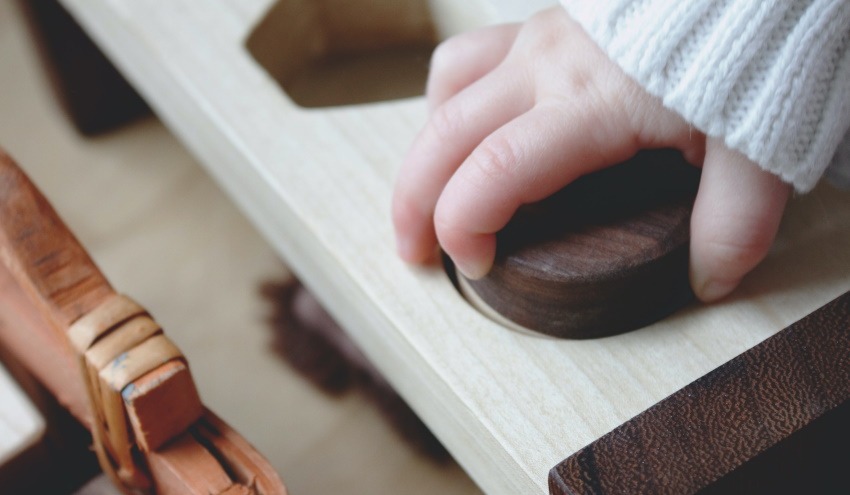
Toddler years are a time of incredible brain development. You can almost see the cogs turning as they try to figure things out!
Toddlers observe their surroundings more and absorb everything like a sponge. At this age, they carefully observe adults’ behavior and start imitating what they see and hear. Therefore, as parents, we must make sure to set up a good example.
1-2 years old
During toddler years, kids learn how to better process and organize information. As they explore the objects in their environment, they will learn concepts such as size, shape, and weight.
1-year-olds start exploring things in new ways, for example, by throwing, shaking, and banging them together. They can now put objects in the container and take them out, which can be used as a fun game activity. If you hide something from your 1-year old, they are likely to find it easily.
When you name things, you will notice your child is looking at the right picture or an object. Gradually, they will start pointing at and naming familiar objects themselves. Your toddler may point to body parts upon request. This is also the time when a child begins to understand simple directions, for example, “Please, give me the spoon.”
Even though your child is eager to explore, they still want to have you near.
2-3 years old
Your toddler is becoming increasingly independent, and gradually, the separation from parents becomes easier for them.
They are starting to understand simple relationships (e.g., big and small) and express their thoughts using simple sentences.
At this age, a child becomes more imaginative during playtime, which makes parents’ engagement in playing a lot easier (at least that’s how it was for me; I couldn’t wait for the time when I can play make-believe games with my daughter).
When you read their favorite book to them or sing a familiar rhyme, you will notice that they are finishing sentences. Toddlers begin to sort shapes and colors and match objects with their uses and sort them by category.
An exciting activity for your toddler at this point may be naming body parts or picking out and naming items in a picture book. They are now also able to follow two-steps directions.
As they approach the age of 3, your child will engage even more in pretend play, be able to solve simple puzzles and retell a story from a book. They will also start developing a sense of humor. Another exciting thing your child learns at this age is to tell their full name and age.
How to Encourage Cognitive Toddler Development
- Encourage your child to explore the world around them and help them do it
- Name the objects your child interacts with and shows an interest in
- Play with your child—hide the object so your child can practice finding it; play letters and number games; encourage them to sort sizes, shapes, and colors; play matching games (e.g., animal and the sound); play games that could help teach cause and effect (e.g., toys with buttons they can push to make something happen); encourage them to put together basic puzzles (help them when needed)
- Read books and sing nursery rhymes and, when they’re old enough, encourage them to join in singing or ask them what happens next as you read a familiar book to them
- Encourage pretend play
- Involve your child in simple routines, procedures, and chores (e.g., include them in preparing a meal) and praise their effort
- Ask simple questions to encourage the development of problem-solving skills
- Spend time outside and encourage them to explore and play
Cognitive Development Red Flags
It is recommended to talk to your child’s doctor if your child (according to CDC):
By the age of 1
- Doesn’t search for things that they see you hide
- Doesn’t point to things
By the age of 18 months
- Doesn’t point to show things to others
- Doesn’t know what familiar things are for
- Doesn’t copy others
By the age of 2
- Doesn’t know what to do with common things (e.g., spoon, brush)
- Doesn’t copy actions or words
- Can’t follow simple instructions
By the age of 3
- Can’t work simple toys (e.g., pegboards, simple puzzles, turning a handle)
- Doesn’t understand simple instructions
- Doesn’t play pretend or make-believe
- Or if your child loses skills they once had
Social-Emotional Development Milestones

Your toddler is becoming more aware of themselves as an individual. Their social and emotional development is crucial for their well-being.
In the early years, not limited only to toddlerhood, a child’s relationship with people closest to them will shape how they will see the world and who they will become and impact the future relationships they form. Therefore, it is essential to support children in learning who they are and how to interact with others and help them understand and learn how to manage their emotions through a nurturing and loving relationship.
1-2 years
During this time, a child develops strong bonds with their loved ones, even though they simultaneously want to be more independent.
Your toddler is likely to be shy and nervous with strangers and may show fear in some situations. They may struggle with separating and cry when mom or dad leaves.
Very early, they show preferences for certain people and places, and they learn how to get attention by repeating sounds or actions.
They are affectionate and express love openly and start seeking approval and praise. This is also a time when they begin experiencing embarrassment, empathy, and envy. When they learn a new skill or are praised, they feel pride.
Although they get excited when around other children, they still mostly play alongside other children, but not with them. However, it is common for kids to express possessiveness and refuse to share at this age.
2-3 Years
Be ready for a wide range of emotions (your child and yours). At this age, toddlers often switch between dependence and independence, and at certain times it is not easy to understand what they actually want and need.
Your child desires consistency, and changes in routine may upset them. They are pretty self-centered at this point, but they also desire approval and acceptance.
Playtime with other children gradually switches from playing alongside each other to playing with each other, and when a child is near three years old, they will also start taking turns when playing with other children. Although they begin cooperating while playing, they may still have a strong sense of ownership, and they begin to understand the concept of “mine,” “his,” “hers.”
One of the most challenging aspects of social-emotional development at this age is the beginning of tantrums and defiant behavior. Your child’s desire to be more independent is incredibly exciting (both for kids and parents) because they start discovering so much about themselves and their surroundings. Still, it often leads to frustration, too (again, both from a child and parents).
Tantrums are a usual occurrence at this age as toddlers learn about frustration. They are testing borders, asserting their independence, and they don’t understand why they can’t always get what they want when they want it.
It is completely understandable that this behavior frustrates you, but try to remind yourself that your child is dealing with overwhelming emotion. You are their safe harbor, and you need to help them learn how to regulate their emotions. It doesn’t make it easier, I know, and sometimes you’ll snap at your child in a situation like this, but remember that it isn’t easy for them either. This reminder may help you respond to your child’s behavior instead of just reacting to it.
How to Encourage Social-Emotional Toddler Development
- Show affection to your child—hug them, kiss them, tell them how much you love and care for them, talk to them, and spend quality time with them
- Establish a trusting relationship
- Provide a consistent and predictable environment
- Acknowledge your child’s emotions and make them understand they are loved and accepted
- Allow your child to express their emotions—emotions aren’t good or bad—and help them learn how to regulate them
- Teach your child to name and describe their emotions
- Show your feelings to help them learn all of us experience a wide range of emotions and to help them develop empathy
- Praise your child for following instructions and praise good behavior
- Limit attention for defiant behavior
- Encourage empathy and reinforce it when you see it
- Encourage playing and sharing, go on playdates or to places where there are other children your child can play with
- If you feel you and your child could benefit from it, work on yourself and your self-regulation, too—this also sets an excellent example for your child
Social-Emotional Development Red Flags
It is recommended to talk to your child’s doctor if your child (according to CDC):
By the age of 18 months
- Doesn’t copy others
- Doesn’t notice or mind when a caregiver leaves or returns
By the age of 2
- Doesn’t copy actions and words
By the age of 3
- Doesn’t make eye contact
- Doesn’t want to play with other children or with toys
- Or if your child loses skills they once had
Communication and Language Skills
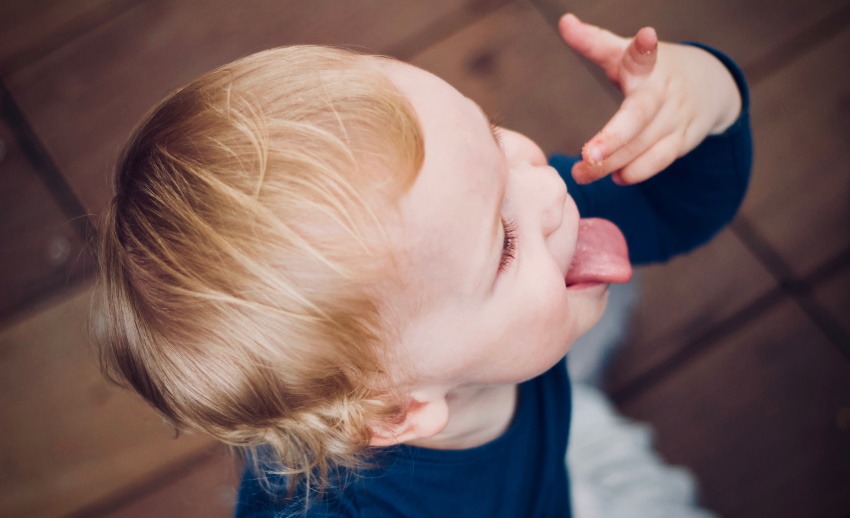
Like all other aspects of development described above, your toddler’s communication and language skills grow by leaps and bounds. This is such an exciting period because your child will finally be able to communicate with you using words. Gradually, they will start expressing their needs, thoughts, and feelings.
You will most likley regularly laugh hard because of the things your child says and feel overwhelming joy when they openly express their love for you.
1-2 Years
1-year-old’s vocabulary usually consists of “mama,” “dada,” and one to two additional words. They may respond to a simple request and understand simple instructions. Waving for goodbye and shaking their head for “no” and other simple gestures are used at this age. If you ask your child to point to some of the main body parts, they will likely be able to do it (e.g., “Where is your eye?”)
Even though they still can’t repeat words, kids this age make changes to their tone when making sounds that mimic normal speech.
Your toddler will soon progress to saying several single words and understanding one-step instructions. By the age of 2, most kids can say 50 or more words, and many combine words in short sentences and phrases.
2-3 Years
At this age, baby talk is replaced by real words. At 2 years old, your child is likely to start constructing sentences of two to four words. Now they can also follow simple instructions.
When an object is named, or there is a picture of it, they will name it, and when you are reading a book, they’ll point to things in it.
Soon, they’ll be asking you a lot of “What” and “Where” questions and start explaining things to you.
You’ll probably want to be more careful with the words you use around your child because toddlers hear everything, and they will repeat the words they overheard, even when you didn’t know that they actually heard you—they did, and they’ll remember it.
Your child now knows the main body parts and also the names of close family members and familiar people.
As your child’s third birthday approaches, they will know how to say their name, age, and sex. They will also be able to name most familiar things. Get ready to hear the famous toddler question, “Why,” frequently.
At this point, a toddler will most likely know at least three propositions, usually “in,” “on,” and “under,” and will use pronouns such as “I,” “me,” “we,” “you,” and some plurals.
Their sentences are becoming longer, they can string at least three words together in a sentence, and they can continue a conversation using two to three sentences.
As their language skills continue to improve, your toddler will now be understood even by strangers (at least most of the time).
How to Encourage Communication and Language Development
- Talk to your child, even if you are just describing to them what you are doing
- Read books and share stories
- Sing songs and say rhymes
- During playtime, describe what is happening
- In early toddler years, use simple phrases and ask simple questions
- Name body parts, the objects in your child’s surroundings, or the pictures in the books you are reading to them
- Encourage your child to identify objects and name body parts, animals, and other common things
- Encourage your child to use a word instead of pointing to an object; help them by giving them the first sound or the beginning of the word if they still can’t say the whole word
- If your child says a word incorrectly or uses a made-up word, repeat the correct word to them
- When you are giving instructions, limit them to one to two steps and make sure they are clear and simple
Here are more ways to stimulate language development in toddlers.
Communication and Language Development Red Flags
It is recommended to talk to your child’s doctor if your child (according to CDC):
By the age of 1 year
- Doesn’t learn gestures like waving or shaking head
- Doesn’t say single words like “mama” or “dada”
By the age of 18 months
- Doesn’t point to show things to others
- Doesn’t gain new words
- Doesn’t have at least 6 words in their vocabulary
By the age of 2
- Doesn’t follow simple instructions
- Doesn’t use 2-word phrases
By the age of 3
- Drools or has a very unclear speech
- Doesn’t understand simple instructions
- Doesn’t speak in sentences
- Or if your child loses skills they once had
Takeaway
Toddlerhood is a time of significant change—it is incredibly fascinating but may also feel overwhelming at times. However, remind yourself to enjoy it, because they grow so fast, and before you know it, they won’t be your little ones anymore. Make memories with your child—you will cherish them more than anything later.
If you have any thoughts, questions, or memories to share about toddler development, post them below!
Read Next
- 5 Powerful Parental Habits for Happy Kids with Self Worth!
- Signs of Autism in Babies and Toddlers, Diagnosis, Treatment, Coping
- What if a 21-Month-Old Toddler Is Not Talking?
- Why Is Baby Grabbing Their Private Parts? 3 Reasons to Know!
- 7 Tips If Sibling Hates The New Baby: Can I Make Them Bond?
References
- Centers for Disease Control and Prevention. (n.d.). Milestone Moments: Learn the signs. Act early.
- Cherry, K. (2021, July 30). Cognitive developmental milestones
- Child Development Institute. (n.d.). Toddler Development & Parenting Tips (18 months – 3 years)
- Expert Community Care Management. (n.d.). Growing minds with cognitive development activities for toddlers
- Nemours Kids Health. (n.d.). Your child’s development: 3 years
- RaisingChildren.net.au. (n.d.). Emotions and play: toddlers
- RaisingChildren.net.au. (n.d.). Thinking and play: toddlers
- The Children’s League. (n.d.). Developmental red flags

Paula Dennholt founded Easy Baby Life in 2006 and has been a passionate parenting and pregnancy writer since then. Her parenting approach and writing are based on studies in cognitive-behavioral models and therapy for children and her experience as a mother and stepmother. Life as a parent has convinced her of how crucial it is to put relationships before rules. She strongly believes in positive parenting and a science-based approach.
Paula cooperates with a team of pediatricians who assist in reviewing and writing articles.



